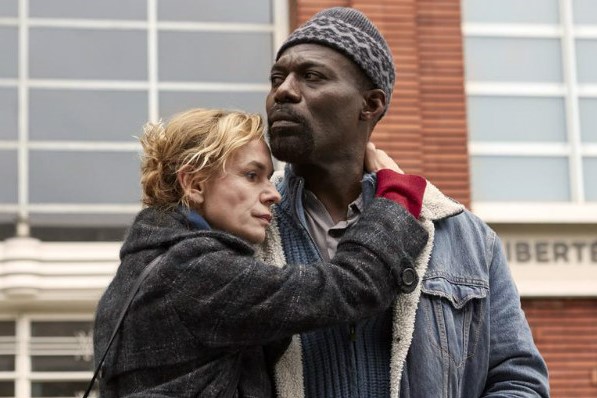Built out from a richly drawn and sensitive performance by Eriq Eboauney, A Season In France, Chadian director Mahamat-Saleh Haroun’s new film, begins in and starts to cultivate a haunting and associative manner. School teacher Abbas (Ebouaney), who moved to France to escape unrest in the Central African Republic, is dreaming of his deceased wife, who seems to appear before him, walking through the halls of his temporary apartment, always only slightly beyond his grasp.
His grief is so profound it creates a presence of her absence, and so in the following scene, in which he calms his daughter Asma to sleep with a song the family used to sing, his wife’s voice beautifully commences on the soundtrack while father and daughter share a bemused look. The interplay of the life he has to lead and the ache of loss, the pain he’s storing away for the sake of his kids and his brother Etienne (Bibi Tanga), creates barriers between him and others, barriers which become literalised when he runs into trouble with his application for asylum in France.
Ebouaney’s performance is reason enough to see the film and its most persuasive asset. He plays Abbas as a kind man, tender and sincere with those he loves, but always moments away from the first signs of coming unstuck. In an early scene, he reads a list on a bulletin board regarding his application for asylum: Haroun’s camera doesn’t confirm, but the actor does. Framed from his right, he repositions himself, the news knocking him back a step; his lip quivers; his breathing is deep and uneasy; there’s a noticeable twinge in his temple. These details do all the work, and it’s all due to the finely wrought nature of Ebouaney’s acting that they inform as clearly as they do.
Haroun has, for the most part, a habit of diverting the expected route of a scene. As Etienne visits his girlfriend, he brings her a papaya. She’s pleased. She takes a knife, slices it down the middle, and briefly and ever so slightly runs his fingers across the seeds. This is a scene encountered many a time before: the pleasure of the fruit’s textures becomes a way to sidewind into sex. And yes, that’s sort of what happens here; but the note the film hits following this moment counteracts it, in a way both commendable for turning away from where it seemed to be leading, but also in a way disappointing, for the alternative turns out not to have much to recommend it.
A Season In France’s problems begin with Etienne, gradually defeated by the hostility, bureaucratic and personal, displayed towards him and other migrants. Here the film resembles Claire Denis’s No Fear, No Die (1990), with regard to how a character succumbs to their circumstances. But where Denis rests layer upon layer of possible meanings atop each other, Haroun is strikingly literal, in a way that doesn’t play to the director’s strengths as a filmmaker attending to the minute particulars of Abbas and his family’s life.
The other problem is Sandrine Bonnaire — not a sentence which should be often written. She plays Carole, Abbas’s white girlfriend; caring and determined as Abbas, she’s on immediate good terms with his kids, and as his situation worsens, he comes to rely on her. It’s not that her performance is poor, but what her performance means, what it’s there for. Put simply: she’s the anchor for the white audience’s sympathy.
This patronising convention works against the film’s final moments, meant to contextualise the story within the present, to draw explicit parallels with and pay tribute to real lives. But Bonnaire’s role flattens the ending, and the film’s calm and moving lucidity is traded in for a misconceived attempt at explicitness.
@Filmhouse, Edinburgh from Wed 28 Aug 2019
